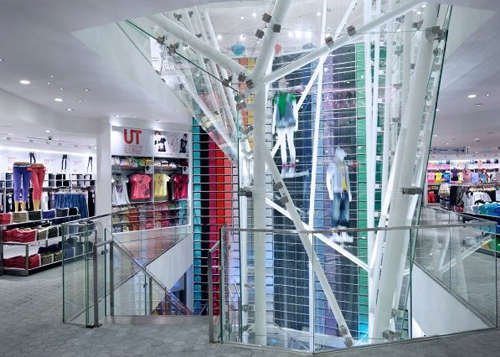Uniqlo pushes the global fashion 20 years to achieve Super League in Japan
In order to become the world's largest clothing retailer, Fast Retailing Co. (9983-JP), Asia’s largest chain apparel store, plans to promote Uniqlo, a famous brand of Uniqlo, to the fast-growing markets of India and Brazil. China is expanding its territories and it is expected that by 2020, the total number of stores in China will surpass Japan.

The so-called "fast-fashion" fashion retail sector is currently led by the Zara brand of Inditex SA (ITX-ES) in Spain; meanwhile, the Swedish firm Hennes & Mauritz AB (HMB-SE) is also rapidly expanding globally. The main reason for the operation lies in the change in consumption habits. Compared with high-priced products, people prefer clothing that is affordable and cheap.
Fast Retailing stated that the company’s goal is to surpass Zara and H&M within 10 years. At present, the company continues to open new stores, especially in Asia.
Uniqlo's brand fashion is different from other competitors, offering products such as wool jackets, jeans or warm shirts based on leisure and economic benefits. Chief Executive Naoki Otoma of Fast Retailing stated: "We don't sell clothes that last only one season."
In the domestic market Uniqlo has set off a boom to break the rules of many Japanese companies. Fast stipulates that in a business meeting with the participation of foreigners, it is necessary to speak in English in the entire course; by 2012, all correspondence emails must be written in English; and it is expected that in 2015, the number of foreign employees will surpass that of Japan.
Fast's style is rapidly becoming a model for the Japanese industry. Other Japanese companies face double obstacles. In addition to shrinking domestic demand, they also lack high-level executives with global market professionalism and language skills.
Uniqlo estimates that at the end of August this year (2010), it has 844 stores in Japan and 76 in China. By 2020, the total number of stores in China is estimated to be as high as 1,000. On October 31, Zara had only 60 stores in China.
Otoma stated that Uniqlo also hopes to enter markets such as India and Brazil within five years. Although Indian foreigners can currently only occupy a small amount of market interest through local partners, Otoma claims: “According to our research, these restrictions may disappear within one year.â€
In the key US market, Uniqlo is rebuilding its brand positioning to make up for early operational mistakes. The company is currently evacuated from the suburban shopping malls and has only left a single storefront in Manhattan's SoHo district. Fast is currently planning to open an online store to capture more American consumers' eyes and plans to open a flagship store in Fifth Avenue in New York City in the next year (2011).
Although Fast has a great vision for global development, in the past year, after a period of lucrative profits, the performance of the company has been bumpy.
In November, Fast's same-store sales in Japan were reduced by 15% year-on-year. The fourth consecutive month saw a contraction, the number of customers visiting the stores shrank by 7%, and single-customer sales fell 8.1%.
Fast had expected in October that the company's full-year net profit would be the first decline in four years, a decrease of 17% to 51 billion yen ($608 million). It is estimated that net sales will increase by 5% to 859 billion yen. Nevertheless, the stock price of the company has dropped by 27% this year.
Analysts said that with more than 800 Uniqlo stores in Japan, the market is already saturated and consumer spending tends to be conservative.
Otoma pointed out that there is still a lot of need for learning in Fast itself, especially for foreign competitors. He declared: “We can learn from H&M and Zara. They are very fast at exhibiting stores and are very aggressive in expanding new business space, whether successful or not. In contrast to Japanese companies, it is over-cautious to operate.â€
Crystal Musical Instrument,Crystal Crafts,Craft Crystals ,Glass Crystals For Crafts
Crystal Crafts Co., Ltd. , http://www.nbcandleholder.com